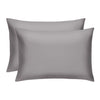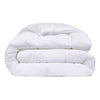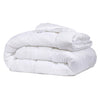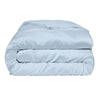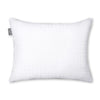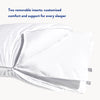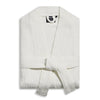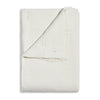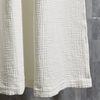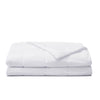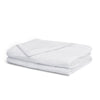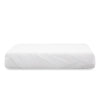The best type of laundry detergent for sensitive skin is one that avoids harsh chemicals, artificial additives, and heavy fragrances. According to the infographic, there are several good options to consider: hypoallergenic detergents, which are free from common allergens and reduce the risk of reactions; fragrance-free detergents, which skip added scents to minimize irritation; dye-free detergents, which eliminate artificial colors that can trigger skin issues; dermatologist-tested detergents, which are professionally verified as gentle; and plant-based detergents, which use natural ingredients with fewer harsh chemicals, though it’s important to check for potential allergens. Overall, choosing a hypoallergenic, fragrance-free, dye-free, dermatologist-tested, or plant-based formula is the safest route for sensitive skin.
The Daily Miracle
Can Laundry Detergent Cause Hives: Facts vs Myths
Published
August 31, 2025
Author
Suze Dowling

If you or your loved ones have ever experienced sudden rashes or persistent itching after wearing clean clothes, you’re not alone in wondering if laundry detergent is to blame. As concerns about skin sensitivity and allergies rise, it’s crucial to understand how everyday products might impact our health. This guide dives into the science and myths behind laundry detergent and hives, offering practical advice for safer, more comfortable laundry routines.
What Are Hives?
Hives, also known as urticaria, are raised, red or skin-colored welts that appear suddenly on the skin and are often accompanied by intense itching or burning. These welts can vary in size and shape, sometimes merging to form larger patches, and typically move around the body, fading in one area as they appear in another. Hives are usually a result of the body’s immune system reacting to a trigger—such as an allergen, medication, or irritant—causing the release of histamine and other chemicals into the skin. While most cases of hives are temporary and resolve within hours or days, some can persist longer or recur frequently, especially in people with underlying allergies or sensitivities.
Why Do Some People Suspect Laundry Detergent Causes Hives?
Many people suspect laundry detergent causes hives because these products often contain chemicals, fragrances, and dyes known to irritate sensitive skin. When clothes are washed, traces of detergent can remain in the fabric and come into direct contact with the skin, especially in areas prone to friction or sweating. For individuals with allergies, eczema, or heightened skin sensitivity, this exposure can trigger an immune response, leading to red, itchy welts or hives. The timing of symptoms—often appearing soon after wearing freshly laundered clothing—further fuels the belief that detergent is the culprit, prompting many to seek out hypoallergenic or fragrance-free alternatives.
Can Laundry Detergent Cause Hives?
Yes, laundry detergent can cause hives in some individuals, especially those with sensitive skin, allergies, or underlying skin conditions. The chemicals, fragrances, and dyes commonly found in many detergents can act as irritants or allergens, triggering an immune response that results in red, itchy welts on the skin. Even after rinsing, small amounts of detergent residue can remain on clothing and come into contact with the skin, leading to irritation or allergic reactions. While not everyone will experience hives from laundry detergent, those who are prone to skin sensitivities should consider using hypoallergenic, fragrance-free products and ensure thorough rinsing to minimize the risk.
Laundry Detergent Facts
-
Some laundry detergents contain fragrances, dyes, and chemicals that can irritate sensitive skin and trigger allergic reactions, including hives.
-
Residue from detergent can remain on clothing and bedding, coming into direct contact with the skin and potentially causing irritation.
-
Hypoallergenic and fragrance-free detergents are formulated to reduce the risk of skin reactions for people with sensitivities.
-
Individuals with pre-existing skin conditions like eczema or allergies are more likely to experience hives from certain detergents.
-
Proper rinsing and using the recommended amount of detergent can help minimize the risk of skin irritation.
Laundry Detergent Myths
-
All laundry detergents are equally likely to cause hives, regardless of their ingredients.
-
Only people with diagnosed allergies need to worry about detergent-related skin reactions.
-
Switching detergents is always necessary if you develop hives, without considering other possible causes.
-
Natural or homemade detergents are always safer and less likely to cause skin irritation.
-
Visible residue on clothes is the only sign that detergent is causing a reaction.
Are Hives From Detergent Common or Rare?
Hives caused by laundry detergent are relatively uncommon in the general population but can be a frequent issue for individuals with sensitive skin, allergies, or pre-existing skin conditions like eczema. Most people can use standard detergents without any problems, but those who are more susceptible may experience outbreaks of hives after contact with detergent residues left on clothing or linens. The likelihood of developing hives depends on factors such as the specific ingredients in the detergent, the individual’s skin sensitivity, and how thoroughly clothes are rinsed. While not a widespread problem, detergent-induced hives are significant enough to prompt many people to seek out hypoallergenic or fragrance-free alternatives.
How Long After Exposure Do Detergent-Related Hives Appear?
Detergent-related hives typically appear within minutes to a few hours after the skin comes into contact with freshly laundered clothing or linens containing irritants or allergens. In some cases, the reaction may be delayed and develop several hours later, especially if the exposure is prolonged or repeated throughout the day. The timing can vary depending on an individual’s sensitivity, the amount of detergent residue present, and whether the skin is already compromised by other conditions. Prompt identification of the trigger and removing the source of irritation—such as changing clothes or re-washing items with a gentle detergent—can help reduce the severity and duration of the hives.
Can Natural or Organic Detergents Also Cause Hives?
Yes, natural or organic detergents can also cause hives, especially in individuals with sensitive skin or allergies. While these products often avoid harsh chemicals, synthetic fragrances, and dyes, they may still contain plant-based ingredients, essential oils, or natural fragrances that can act as allergens or irritants. The term “natural” does not guarantee a product is hypoallergenic or free from potential triggers. People prone to skin reactions should carefully review ingredient lists, perform patch tests when trying a new detergent, and choose fragrance-free or dermatologist-recommended options to minimize the risk of hives.
What Type of Laundry Detergent Is Best for Sensitive Skin?
Common Laundry Detergent Mistakes To Avoid
-
Using too much detergent can leave residue on clothes and increase the risk of skin irritation or hives.
-
Skipping the extra rinse cycle allows more detergent and allergens to remain in fabrics.
-
Choosing detergents with strong fragrances or dyes, which are common triggers for sensitive skin reactions.
-
Failing to read ingredient labels, potentially overlooking allergens or irritants in “natural” or “eco-friendly” products.
-
Washing all family members’ clothes together, which can transfer irritants from one person’s laundry to another’s, especially if someone has sensitive skin.
Conclusion
Laundry detergent can be a hidden trigger for hives and skin irritation, particularly in individuals with sensitive skin, allergies, or underlying conditions. While not everyone will react to standard detergents, understanding the potential risks and recognizing symptoms early can help you make safer choices for yourself and your family. Opting for hypoallergenic, fragrance-free, and dye-free detergents, using the correct amount, and ensuring thorough rinsing are practical steps to minimize skin reactions. By staying informed and attentive to your skin’s needs, you can confidently enjoy clean, comfortable clothing without the worry of unexpected hives.
Sources


